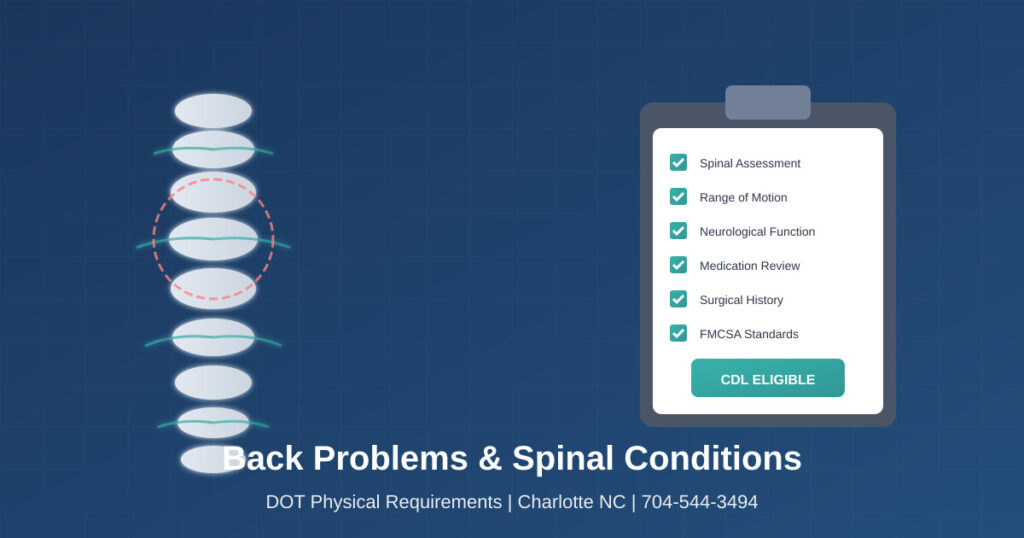TL;DR: DOT Drug Testing in Charlotte NC
$140 drug test only | $200 combined with DOT physical
DOT 5-panel urine drug screen per 49 CFR Part 40
Negative: 20 minutes | Positive: 24 hours after MRO review
Pre-employment, random, post-accident, reasonable suspicion, return-to-duty, follow-up
LabCorp (HHS-certified laboratory)
Fastest Labs and AnyLabTestNow locations throughout Charlotte
Mon-Fri 9 AM – 5 PM | Sat 9 AM – 12 PM
8415 Pineville-Matthews Rd, Suite 102, Charlotte, NC 28226
Charlotte DOT Exam Center has provided DOT physical examinations and drug testing since 1991. Our FMCSA-certified medical examiners—Dr. Alan Tebby and Dr. Lemuel Byrd—bring 84+ years of combined clinical experience to every examination. We’ve completed thousands of DOT exams for Charlotte-area drivers and maintain a 4.8-star rating from drivers who trust our expertise.
We provide comprehensive DOT drug testing services for commercial drivers and employers throughout the Charlotte metropolitan area. Our team conducts all federally mandated drug testing types in full compliance with Department of Transportation regulations.
✓ Why Drivers Choose Us Over Urgent Care and Occupational Health Chains
Unlike urgent care clinics or national occupational health chains like Concentra, we specialize exclusively in DOT compliance services. Our medical examiners complete DOT physicals and drug tests daily—not as a side service between treating colds and injuries. This focused expertise means faster appointments, fewer errors on your medical card, and staff who understand the regulations that affect your livelihood.
What Is DOT Drug Testing?
DOT drug testing is a federally mandated screening program designed to keep America’s roadways safe by ensuring commercial motor vehicle operators are free from prohibited substances. The Federal Motor Carrier Safety Administration requires all safety-sensitive transportation employees to undergo drug testing as a condition of employment and continued service.
Unlike standard pre-employment drug screens that many companies use, DOT drug testing follows strict federal protocols established in 49 CFR Part 40. These regulations govern every aspect of the testing process, including specimen collection procedures, laboratory analysis methods, Medical Review Officer protocols, and result reporting requirements.
⚠️ Important: Clearinghouse Reporting
The consequences of failing or refusing a DOT drug test extend far beyond losing a single job. A positive result or refusal triggers mandatory reporting to the FMCSA Drug and Alcohol Clearinghouse, which employers must query before hiring any CDL driver. This federal database creates a permanent record that follows you throughout your commercial driving career.
We conduct all DOT drug testing in strict accordance with federal regulations. Our staff maintains current knowledge of FMCSA requirements and ensures proper chain of custody procedures protect the integrity of every specimen we collect.
Who Needs DOT Drug Testing?
Federal regulations require DOT drug testing for all employees who perform safety-sensitive functions in the transportation industry. For commercial motor vehicle operations regulated by FMCSA, this includes anyone who operates vehicles requiring a Commercial Driver’s License.
Commercial Drivers Subject to DOT Drug Testing
You need DOT drug testing if you operate any of these vehicle types:
- Heavy trucks: Vehicles with a gross vehicle weight rating of 26,001 pounds or more
- Combination vehicles: Any combination exceeding 26,001 pounds GCWR when the towed vehicle exceeds 10,000 pounds GVWR
- Passenger vehicles: Vehicles designed to transport 16 or more passengers, including the driver
- Hazardous materials: Any vehicle transporting hazardous materials requiring placards under DOT regulations
This encompasses tractor-trailer drivers, bus operators, tanker truck drivers, hazmat transporters, and delivery drivers operating heavy vehicles. Both interstate and intrastate commercial drivers in North Carolina must comply with DOT drug testing requirements.
Other DOT-Regulated Industries
While we primarily serve FMCSA-regulated drivers, DOT drug testing requirements also apply to employees in other transportation sectors:
- Federal Aviation Administration: Flight crews, aircraft dispatchers, aviation screeners, and air traffic controllers
- Federal Railroad Administration: Engineers, conductors, and other railroad operating employees
- Federal Transit Administration: Operators of buses, rail cars, and other public transit vehicles
- Pipeline and Hazardous Materials Safety Administration: Pipeline operations and maintenance personnel
- United States Coast Guard: Merchant mariners and certain maritime employees
Each DOT agency maintains specific regulations for its industry, though all follow the core testing procedures established in 49 CFR Part 40. If you’re a commercial driver in Charlotte who needs FMCSA-compliant testing, contact us at 704-544-3494 to schedule your appointment.
The DOT 5-Panel Drug Test
The DOT drug test is a standardized 5-panel urine drug screen that tests for five categories of controlled substances. Unlike employer-selected panels used in non-DOT testing, the DOT panel is federally mandated—employers and testing facilities can’t modify it.
Substances Tested in the DOT 5-Panel
🧪 DOT 5-Panel Drug Test Substances
Detects THC metabolites from any source, including CBD and hemp products. State legalization doesn’t exempt you from federal DOT requirements. See our guide on CBD, THC, and DOT drug testing.
Screens for benzoylecgonine, the primary metabolite. Typically detectable for 2-4 days after use.
Includes amphetamine, methamphetamine, MDMA (ecstasy), and MDA. Some prescriptions may require MRO verification.
Tests for codeine, morphine, heroin (6-AM), hydrocodone, hydromorphone, oxycodone, and oxymorphone. Prescriptions require MRO documentation.
No legitimate medical use—any positive result indicates prohibited drug use.
What the DOT Drug Test Does NOT Screen For
Several substances fall outside the DOT 5-panel testing scope:
- Alcohol: Requires separate testing using evidential breath testing equipment. See our DOT alcohol testing guide for requirements.
- Synthetic cannabinoids: Products like K2 or Spice aren’t included in standard DOT testing
- Kratom: Not currently included in DOT testing panels
- Benzodiazepines: Not part of the DOT 5-panel, though some employers add this to non-DOT screens
- Barbiturates: Not included in DOT testing requirements
The absence of a substance from the DOT panel doesn’t mean its use is permitted. Employers can test for additional substances under separate non-DOT testing programs, and impairment from any substance while operating a commercial vehicle violates federal safety regulations.
Types of DOT Drug Tests
Federal regulations establish six circumstances requiring DOT drug testing. We conduct all testing types at our Pineville-Matthews Road facility, with most results available the same day for negative specimens.
📋 Pre-Employment Testing
Pre-employment DOT drug testing must occur before you perform safety-sensitive functions for a new employer. Employers can’t allow you to begin work until receiving a verified negative result. They must also query the FMCSA Clearinghouse before hiring.
🎲 Random Testing
Random DOT drug testing requires employers to test at least 50% of their driver pool annually. When you’re notified of selection, you must proceed immediately to the collection site. We can refer you to consortium programs.
🚨 Post-Accident Testing
Post-accident DOT drug testing is required following accidents with fatalities, injuries requiring off-scene treatment (with citation), or disabling vehicle damage (with citation). You must complete testing within 32 hours.
👁️ Reasonable Suspicion Testing
Reasonable suspicion DOT drug testing occurs when a trained supervisor observes specific signs of drug use. We accommodate these time-sensitive situations during business hours with minimal wait times.
🔄 Return-to-Duty Testing
Return-to-duty DOT drug testing is required before you can resume safety-sensitive duties after a violation. You must first complete SAP evaluation and any recommended treatment.
📅 Follow-Up Testing
Follow-up DOT drug testing continues after returning to duty following a violation. The SAP establishes the schedule—at least six tests in the first 12 months, potentially continuing up to 60 months.
DOT Drug Testing Process at Charlotte DOT Exam Center
Understanding the DOT drug test collection process helps you arrive prepared and complete testing efficiently. Our trained collectors follow all federal protocols to ensure specimen integrity and regulatory compliance.
Check-In and Identification
When you arrive, you’ll present valid photo ID (driver’s license, passport, or government-issued ID). Our collector verifies your identity and provides the Federal Drug Testing Custody and Control Form for review and signature.
Specimen Collection
Our collector explains the process and instructs you to empty pockets and remove outer garments. You’ll wash your hands and provide at least 45 milliliters of urine in a private restroom. The collector waits outside unless direct observation is required.
Specimen Processing
We verify the specimen temperature falls within 90-100°F. Your specimen is split into primary and split bottles, sealed with tamper-evident tape in your presence. You’ll initial the seals to verify the specimen hasn’t been altered.
Laboratory Analysis
We ship specimens to LabCorp, an HHS-certified laboratory. The lab performs initial immunoassay screening. Specimens with presumptive positive results undergo GC-MS confirmation testing to eliminate false positives.
Medical Review Officer Review
All results go to a Medical Review Officer—a licensed physician with specialized training. For positive results, the MRO contacts you to discuss legitimate medical explanations (such as valid prescriptions) before making the final determination.
Result Reporting
Negative results are typically available within 20 minutes for on-site screening. Positive results are reported within 24 hours after the MRO interview. We report results to your employer’s designated representative and the Clearinghouse as required.
DOT vs Non-DOT Drug Testing
Many employers conduct both DOT and non-DOT drug testing, and understanding the differences helps you and your employer maintain compliance.
Key Differences Between Testing Programs
We conduct both DOT and non-DOT drug testing. We can also arrange hair testing for employers requiring this method for non-DOT screening purposes. Contact us at 704-544-3494 to discuss your testing requirements.
FMCSA Drug and Alcohol Clearinghouse
The FMCSA Drug and Alcohol Clearinghouse is a federal database containing records of drug and alcohol violations by CDL holders. Employers must query this database before hiring drivers and annually for current employees.
What Gets Reported to the Clearinghouse
📊 Clearinghouse Reporting Requirements
- Verified positive drug test results
- Alcohol confirmation tests with results of 0.04 or higher
- Refusals to test (including adulterated or substituted specimens)
- Actual knowledge violations determined by employers
- Negative return-to-duty test results
- Completion of follow-up testing plans
Medical Review Officers report positive drug tests and refusals directly to the Clearinghouse. Employers report alcohol violations and actual knowledge determinations.
Employer Clearinghouse Obligations
We assist employers with Clearinghouse compliance, including query submissions and understanding reporting requirements. Employers must:
- Conduct a pre-employment query on all CDL driver applicants before permitting safety-sensitive functions
- Conduct annual queries on all current CDL drivers
- Report violations to the Clearinghouse within required timeframes
- Obtain driver consent for full queries that reveal detailed violation information
If you have unresolved violations in the Clearinghouse, you can’t perform safety-sensitive functions until completing the return-to-duty process and having your status updated.
Drug Testing Services for Employers and Fleet Managers
We provide comprehensive fleet drug testing services for employers throughout the Charlotte region. Our services help companies maintain FMCSA compliance while minimizing administrative burden.
Complete Drug Testing Program Support
- Pre-employment testing: Fast turnaround to minimize hiring delays
- Random testing: We conduct tests when your drivers are selected
- Post-accident testing: Same-day appointments for time-sensitive situations
- Reasonable suspicion testing: Immediate availability during business hours
- Return-to-duty and follow-up testing: Coordination with SAP requirements
Additional Employer Services
Beyond specimen collection, we help employers with:
- Clearinghouse queries: Assistance with pre-employment and annual queries
- Violation reporting: Guidance on employer reporting obligations
- Policy development: Information on DOT drug testing policy requirements
- Combined services: DOT physical and drug test packages for new hire processing
Collection Partner Network
In addition to our Pineville-Matthews Road location, we partner with Fastest Labs and AnyLabTestNow to provide convenient collection sites throughout the Charlotte area. This expanded network gives your drivers more options for completing required testing without traveling across town.
For employers without existing random testing programs, we can refer you to reputable consortium administrators serving the Charlotte area. Contact us at 704-544-3494 to discuss your company’s drug testing needs.
What Happens If You Fail a DOT Drug Test
A failed DOT drug test triggers immediate consequences that affect your commercial driving career. Understanding the process helps you navigate the path back to compliance.
Immediate Consequences
🚫 What Happens When You Receive a Verified Positive Result
- Immediate removal: You can’t perform any safety-sensitive functions
- Clearinghouse reporting: The MRO reports the violation to the federal database
- Employer notification: Your employer receives the verified positive result
- SAP referral: Your employer must provide SAP contact information
You can’t drive a commercial vehicle again until completing the entire return-to-duty process. This applies regardless of whether you remain with your current employer or seek new employment.
The Path Back: SAP Process
The Substance Abuse Professional evaluation is mandatory for returning to safety-sensitive duties after a violation. The SAP process includes:
- Initial evaluation: Face-to-face clinical assessment by a qualified SAP
- Treatment or education: Completion of the SAP’s recommended program
- Follow-up evaluation: SAP verification that recommendations were completed
- Return-to-duty authorization: SAP report authorizing the return-to-duty test
The SAP also establishes your follow-up testing schedule, which continues for 12 to 60 months after returning to duty. For detailed information, see our guide on return-to-duty requirements after a failed test.

DOT Alcohol Testing
While we focus primarily on drug testing, understanding DOT alcohol testing requirements is important for comprehensive compliance.
Alcohol Testing Thresholds
- Below 0.02 BAC: Negative result, no action required
- 0.02 to 0.039 BAC: Not a violation, but you must be removed from safety-sensitive duties for at least 24 hours
- 0.04 BAC or higher: Violation requiring SAP evaluation and return-to-duty process
When Alcohol Testing Is Required
DOT alcohol testing applies to random, post-accident, reasonable suspicion, return-to-duty, and follow-up situations. Unlike drug testing, pre-employment alcohol testing is permitted but not required.
The annual random alcohol testing rate is 10 percent of the driver pool, compared to 50 percent for drug testing. Post-accident alcohol testing must occur within eight hours, with a preference for testing within two hours.
We refer alcohol testing to qualified facilities with evidential breath testing equipment. Contact us for referral information if you need DOT alcohol testing services.
DOT Drug Testing Cost and Scheduling
We provide transparent pricing for all drug testing services with no hidden fees or surprise charges.
Drug Testing Pricing
💰 Our Pricing
Pricing includes specimen collection, LabCorp laboratory analysis, and Medical Review Officer review. No additional fees.
Hours and Appointments
🕘 Monday – Friday: 9:00 AM to 5:00 PM
🕘 Saturday: 9:00 AM to 12:00 PM
🚫 Sunday: Closed
Walk-in testing is available during all business hours. For fastest service, call 704-544-3494 to schedule an appointment. Employers with multiple drivers can arrange group appointments for efficient processing.
What to Bring
📝 Bring to Your Appointment
- Valid photo identification (driver’s license, passport, or government ID)
- Employer authorization or testing paperwork if provided
- List of current prescription medications with prescribing physician information
Tip: Arrive with a comfortably full bladder to provide the required specimen volume. Avoid excessive fluid intake, which may dilute the specimen and require retesting.
Frequently Asked Questions About DOT Drug Testing
How much does DOT drug testing cost at Charlotte DOT Exam Center?
DOT drug testing costs $140 at our facility. We also offer a combined DOT physical and drug test package for $200, saving $10 compared to scheduling the services separately. Pricing includes specimen collection, LabCorp laboratory analysis, and Medical Review Officer review with no additional fees.
What drugs does a DOT drug test check for?
The DOT 5-panel drug test screens for marijuana (THC), cocaine, amphetamines (including methamphetamine and MDMA), opioids (including codeine, morphine, hydrocodone, oxycodone, and heroin), and phencyclidine (PCP). This panel is federally mandated—employers and testing facilities can’t modify it.
How long does a DOT drug test take?
The collection process typically takes 15 to 20 minutes. Negative results from our rapid screening are available immediately. Specimens requiring laboratory confirmation are shipped to LabCorp, with negative results typically reported within 24 to 48 hours and positive results within 24 hours after MRO review.
Can CBD cause me to fail a DOT drug test?
Yes, CBD products can cause positive DOT drug test results. Many CBD products contain THC levels sufficient to trigger positive results, and product labels are often inaccurate. The DOT doesn’t recognize CBD use as a legitimate medical explanation for positive marijuana results. You should avoid all CBD and hemp products to protect your career.
What happens if I fail a DOT drug test?
A failed DOT drug test results in immediate removal from safety-sensitive duties, reporting to the FMCSA Clearinghouse, and referral to a Substance Abuse Professional. You can’t drive a commercial vehicle until completing SAP evaluation, any recommended treatment, and passing a directly observed return-to-duty test.
Can I refuse a DOT drug test?
While you have the legal right to refuse, a refusal carries the same consequences as a positive result. Refusals are reported to the Clearinghouse and require completion of the SAP process before returning to safety-sensitive duties. Refusals include failure to appear, leaving before completion, and attempting to tamper with specimens.
How often do CDL drivers get random drug tested?
FMCSA requires employers to randomly test at least 50 percent of their driver pool annually. The actual testing frequency varies since selection is random. Some drivers may be tested multiple times per year while others may not be selected. Each selection is independent, so previous testing doesn’t affect future selection probability.
Do I need a DOT drug test for my CDL renewal?
CDL renewal doesn’t require a drug test. However, you must maintain a valid DOT medical card, which requires periodic DOT physical examinations. Your employer must continue random testing throughout your employment, and any new employer will require pre-employment testing.
Can I take prescription medications and pass a DOT drug test?
Many prescription medications are compatible with commercial driving. If your prescription causes …





















